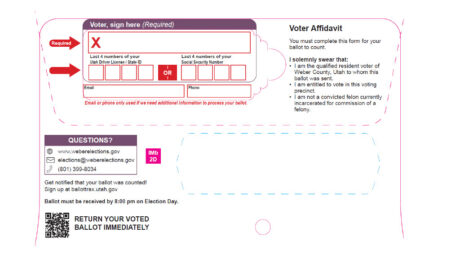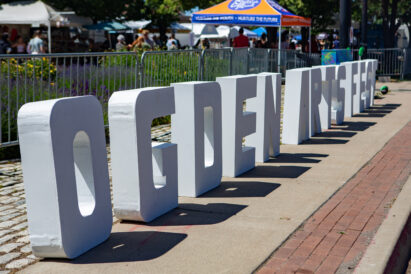Judge rejects local Jan. 6 protester’s bid for early end to probation
- Violent insurrectionists, loyal to President Donald Trump, storm the Capitol in Washington on Jan. 6, 2021.
- Michael Lee Hardin poses inside the U.S. Capitol on Jan. 6, 2021, with a bust of President Abraham Lincoln. This photo was submitted in court by federal prosecutors in their case against Hardin.
- Michael Lee Hardin
SALT LAKE CITY — A federal judge has rejected a Sunset man’s request that he be granted early release from probation on his conviction for being in the U.S. Capitol during the Jan. 6, 2021, riot.
Michael Lee Hardin, a former Salt Lake City police officer, pleaded guilty to class B misdemeanor parading, demonstrating or picketing in the Capitol. Three other charges were dismissed in a plea bargain. A federal judge in Washington, D.C., in April sentenced Hardin to 30 days of home confinement and 18 months’ probation and imposed various restrictions, such as a ban on possessing firearms.
The Washington court transferred Hardin’s probation management case to U.S. District Court in Salt Lake City. In July, Hardin petitioned Judge Clark Waddoups to free him of probation on the grounds that he has complied with all terms and that the U.S. government holds “malice” toward him.
In a recent order, Waddoups denied Hardin’s petition without explanation, advising him that he could file another petition in six months.
The judge’s ruling came in the wake of strenuous arguments between Hardin and U.S. prosecutors in court filings.
In opposing Hardin’s request, the U.S. Attorney’s Office in Salt Lake City said that despite his two decades of police service, Hardin told FBI agents he did not know he had broken the law on Jan. 6. But Judge Timothy Kelly admonished Hardin at sentencing that it was criminal to belong to any violent mob, “even a small part of a mob.” The judge said, “There’s nothing patriotic about it, and no matter how much any of us might not like the way the process of electing the president is proceeding, it’s something we just can’t do.”
On the day in question, supporters of then-President Donald Trump swarmed the Capitol in protest of the Electoral College certification of President Joe Biden’s election.
Prosecutors said Hardin’s request was on thin grounds in any case because mere compliance with probation terms does not warrant early release.
Hardin then filed a rebuttal, accusing the prosecution of “dishonest tactics” in its depiction of his actions at the Capitol. He claimed he was “waved in” by a Capitol police officer and that he then did not cheer rioters who crushed a Capitol officer to break through the East Rotunda doors.
He asserted that prosecutors “created a narrative” that he cheered. He also said the sentencing judge “reprimanded” the prosecution for its “false theories” against him.
In a reply to Hardin’s allegations, prosecutors said in a filing that Hardin “appears to be attempting to exploit” the arguments of Matthew Martin, who was acquitted of charges against him. Martin showed evidence that officers were standing next to him as he entered the Rotunda.
Unlike Martin, Hardin pleaded guilty, prosecutors said, noting Hardin’s statement of offense in which he admitted that he “knew at the time he entered the U.S. Capitol Building that he did not have permission to enter the building and (he) unlawfully paraded, demonstrated, or picketed.”
“There were no police greeting the defendant or watching his entry. There were only rioters streaming in through the doors and through the broken windows on either side of the doors,” the filing said. “Defendant could not claim he thought the police there were inviting him in. They were not there. They had already withdrawn from the area after fiercely attempting to stop the rioters’ entry.”
The prosecution added that Hardin “surely would have seen the people streaming in through windows on either side of the door. As an experienced detective, he could not have mistaken such an entry for a lawful one.”
Regarding Hardin’s observing of the East Rotunda doors breach, prosecutors filed for Waddoups’ review copies of the Capitol police surveillance video. Hardin argued that all he did was raise a hand to the side of his face for “0.5 second” and did not cheer.
Prosecutors, however, said, “The videos show that, at the moment the rioters forced the doors open, (Hardin) shouted three distinct cheers. He can be observed beginning to grin just as the rioters breach the door, then shouting “Yeah!”
Hardin said his chief desire for an early end to probation is to be free of the ban on firearms possession, which he described as unfair. “It is uncommon for 2nd Amendment rights to be infringed upon for a conviction for a class B misdemeanor given no other (aggravating) circumstances,” he said.
Prosecutors have not claimed “that I am or have been associated with any group that may be a threat or distraction to the US government,” he said. “They have no other good reason, other than malice.”
Prosecutors said Hardin “is not facing an unduly harsh penalty. He is not imprisoned. He is on probation.” They said the firearms restriction is “modest” and “presents no undue hardship.” They added, “Millions of Americans manage to live day to day for months or years on end without a firearm. He can too.”
Efforts to contact Hardin were not immediately successful.








